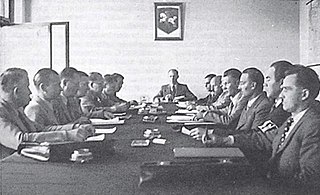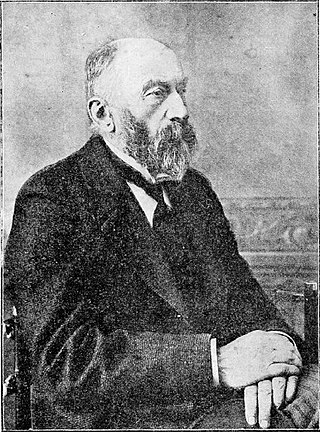
Vilnius is the capital of and largest city in Lithuania and the second-most-populous city in the Baltic states. The city's estimated July 2024 population was 605,270, and the Vilnius urban area has an estimated population of 708,627.

Lake Vištytis is a lake on the border between Lithuania and Russia, near the tripoint with Poland.

The Directory of Open Access Journals (DOAJ) is a website that hosts a community-curated list of open access journals, maintained by Infrastructure Services for Open Access (IS4OA). It was launched in 2003 with 300 open access journals.

The Provisional Government of Lithuania was an attempted provisional government to form an independent Lithuanian state in the last days of the first Soviet occupation and the first weeks of the German occupation of Lithuania during World War II in 1941.

The first known record of the name of Lithuania recorded in the Quedlinburg Chronicle in a 9 March 1009 story of Saint Bruno. The Chronicle recorded in the form Litua. Although it is clear the name originated from a Baltic language, scholars still debate the meaning of the word.
The Public Relations Journal is an open-access peer-reviewed, electronic academic journal covering topics having to do with public relations and communication studies. It is published quarterly by the Institute for Public Relations and the Public Relations Society of America. The editor-in-chief is Hilary Fussell Sisco.

Petras Cvirka was a Lithuanian writer of several novels, children's books, and short story collections. He wrote under a variety of pen names: A. Cvingelis, Cezaris Petrėnas, J. K. Pavilionis, K. Cvirka, Kanapeikus, Kazys Gerutis, Klangis, Klangis Petras, Klangių Petras, L. P. Cvirka, Laumakys, P. Cvinglis, P. Cvirka-Rymantas, P. Gelmė, P. Veliuoniškis, Petras Serapinas, and S. Laumakys. His works have been translated into Belarusian, Bulgarian, Chinese, Czech, English, Estonian, Hungarian, Latvian, Polish, Romanian, and Uzbek.
Vasilijus Safronovas is a Lithuanian historian. Throughout his writings he explores modern cultural and intellectual history of Lithuania and former region of East Prussia, with particular interest to former Territory of Memel/ Klaipėda.
Frontiers Media SA is a publisher of peer-reviewed, open access, scientific journals currently active in science, technology, and medicine. It was founded in 2007 by Kamila and Henry Markram. Frontiers is based in Lausanne, Switzerland, with offices in the United Kingdom, Spain, and China. In 2022, Frontiers employed more than 1,400 people, across 14 countries. All Frontiers journals are published under a Creative Commons Attribution License.

Predatory publishing, also write-only publishing or deceptive publishing, is an exploitative academic publishing business model, where the journal or publisher prioritizes self-interest at the expense of scholarship. It is characterized by misleading information, deviates from the standard peer-review process, is highly non-transparent, and often utilizes aggressive solicitation practices.

The Lithuanian Auxiliary Police was a Schutzmannschaft formation formed during the German occupation of Lithuania between 1941 and 1944, with the first battalions originating from the most reliable freedom fighters, disbanded following the 1941 anti-Soviet Lithuanian June Uprising in 1941. Lithuanian activists hoped that these units would be the basis of a reestablished Lithuanian Army commanded by the Lithuanian Provisional Government. Instead, they were put under the orders of the SS- und Polizeiführer in Lithuania.

Mūsų senovė was a Lithuanian-language academic magazine published in Kaunas, Lithuania in 1921–1922 and in 1937–1940. It was the first attempt to publish a periodical dedicated to the study of the history in Lithuanian. It was published irregularly and mostly dealt with the materials and topics related to the Lithuanian National Revival and the Lithuanian press ban. In total, 10 issues appeared.

Diamond open access refers to academic texts published/distributed/preserved with no fees to either reader or author. Alternative labels include platinum open access, non-commercial open access, cooperative open access or, more recently, open access commons. While these terms were first coined in the 2000s and the 2010s, they have been retroactively applied to a variety of structures and forms of publishing, from subsidized university publishers to volunteer-run cooperatives that existed in prior decades.

The Union for the Liberation of Vilnius was an organization established in 1925 to support Lithuanian territorial claims to Vilnius Region then part of the Second Polish Republic. With 27,000 members and 600,000 supporters in 1937, it was one of the most popular organizations in interwar Lithuania. Its main goal was to mobilize the entire Lithuanian nation for cultural and educational work. It established an unofficial but highly popular national mourning day on 9 October. It organized numerous events, such as lectures and concerts, to promote the idea of Vilnius as an integral part of the Lithuanian national identity – the historical capital of Lithuania that was unjustly occupied by Poland, though the city itself had a minuscule Lithuanian population. It also developed a coherent narrative of suffering brothers Lithuanians under the oppressive Polish regime, giving Lithuanians a common enemy. The union promoted emotional, almost cult-like, national attachment to Vilnius. The union was disestablished after the Polish ultimatum in March 1938.
America in the Bathhouse is a three-act comedy by Keturakis. The play was first published in 1895. It became the first Lithuanian-language play performed in public in present-day Lithuania when a group of Lithuanian activists staged it on 20 August 1899 in Palanga. The play depicts an episode from the everyday life of the Lithuanian village – a resourceful man swindles money from a naive woman and escapes to the United States. Due to its relevant plot, small cast, and simple decorations, the play was very popular with the Lithuanian amateur theater. It became one of the most popular and successful Lithuanian comedies of all time and continues to be performed by various troupes.

Eduards Volters was a linguist, ethnographer, archaeologist who studied the Baltic languages and culture. He was a long-time professor at the Saint Petersburg University (1886–1918) and Vytautas Magnus University (1922–1934).

SciPost is a non-profit foundation dedicated to developing, implementing and maintaining innovative forms of electronic scientific communication and publishing. It is notable for operating the scipost.org open-access scientific publishing portal.

Mečislovas Davainis-Silvestraitis was a Lithuanian journalist, poet, publicist, folklorist, and book smugler during the Lithuanian National Revival, best known for his collection of Lithuanian folklore.

Andrius Vaišnys is a Lithuanian journalist and a professor at Vilnius University and the former Dean of the university's Faculty of Communication.

The Lithuanian Sanitary Aid Society was a Lithuanian society established in 1918 to provide medical care to refugees during World War I. First established in Minsk, the society purchased hospital equipment of a war hospital and relocated to Vilnius in July 1918. There it opened a hospital and continued to operate it until around 1941. Over the years, the hospital treated a total of about 300,000 patients. It was a charitable society, thus many of its treatments were provided at low cost or for free. After Vilnius incorporation into the Second Polish Republic, the society and the hospital were one of a few Lithuanian institutions active in Vilnius Region. The society and the hospital were headed by Danielius Alseika and, after his death, by Vytautas Legeika.
















